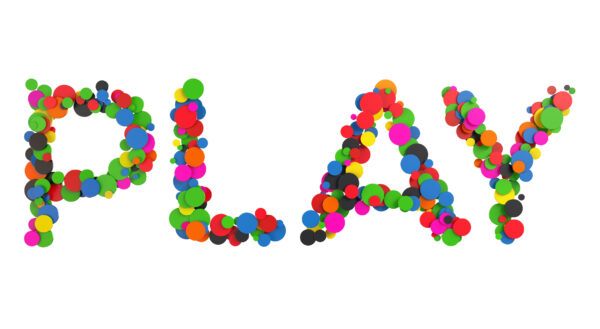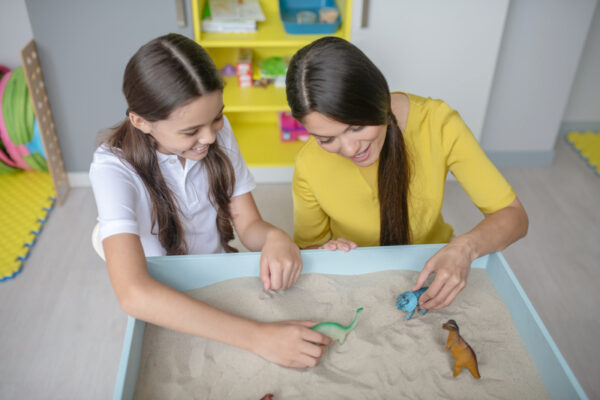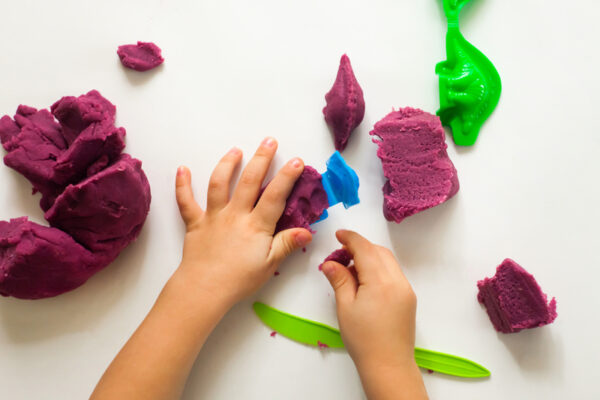What Is Play Therapy?
 Play therapy is an approach to child psychology that honors nonverbal elements of play and imagination in helping children express their emotions and experiences. Often used to treat mental health disorders or adverse life experiences in children, play therapy is the predominant form of therapeutic treatment for younger populations across Western culture.
Play therapy is an approach to child psychology that honors nonverbal elements of play and imagination in helping children express their emotions and experiences. Often used to treat mental health disorders or adverse life experiences in children, play therapy is the predominant form of therapeutic treatment for younger populations across Western culture.
Many well-known and established psychologists, researchers, and clinicians have contributed to the development of play therapy since the 1950s. Even Freud is credited with some of play therapy’s origins, though it became more commonly used among therapists once education experts like Maria Montessori and Margaret Lowenfeld began publishing research on the effectiveness of creative, nonverbal therapies for treating children.
As such, plenty of research has been done to validate play therapy as an effective tool for targeting mental health challenges in children and adolescents. Due to its child-centered and nonverbal elements, it has been demonstrated to treat a wide range of issues including anxiety, trauma, and challenging life transitions. And because it uses the language of play, this form of therapy can be particularly useful for children as young as three who may be nonverbal or have developmental disabilities.
The aim of play therapy is to enhance a child’s understanding of their emotions and improve behaviors. And research shows that play therapy is highly effective when it comes to developing strong social, communication, and problem-solving skills—ultimately allowing children to create more positive associations with the people and environment surrounding them
How Does Play Therapy Work?
Play therapy usually incorporates toys, role play, and other forms of creative expression to help kids understand and verbalize their experiences. Oftentimes, sand tray therapy—an approach that allows a creation of scenes with props and figurines to reflect a client’s internal experience—falls under the umbrella of play therapy. Whereas play therapy is typically used for children and younger adolescents, however, sand tray therapy can be highly effective for clients of all ages.
 Play therapy is often divided into two categories: directive and non-directive. Therapists using directive play therapy are likely to take a more hands-on approach that is focused on outcome and a linear treatment plan. Nondirective play therapy, on the other hand, gives the child a little more agency, resulting in the therapist becoming a more passive and observant influence during the session.
Play therapy is often divided into two categories: directive and non-directive. Therapists using directive play therapy are likely to take a more hands-on approach that is focused on outcome and a linear treatment plan. Nondirective play therapy, on the other hand, gives the child a little more agency, resulting in the therapist becoming a more passive and observant influence during the session.
Regardless of if a directive or nondirective approach is used, the ultimate goal of play therapy is to improve a child’s internal understanding of themself and to help to resolve internal struggles. The therapist will facilitate an atmosphere where the child can feel safe to explore their relationships, fears, and internal feelings. And as the therapist gains a deeper understanding of maladaptive behaviors or internal challenges that have resulted from anxiety, trauma, life transitions, and/or losses, they can then model positive interactions and conduct to the child.
For children, verbal language and complex emotions can be hard to grasp. Therefore, play therapy can be highly effective in filling the gap between experience and communication. Not only can play therapy help children to better understand their emotional processes, but it can also improve their self-regulation skills as they develop day-to-day coping mechanisms and a more solid grasp of their fears and anxieties.
Parents often recognize improved behaviors in children who partake in play therapy. For instance, as a result of play therapy, kids can learn how to be more gracious winners or losers in sports and games, as well as understand the value of fairness and turn-taking. Moreover, beyond its ability to positively shape social and communication skills, play therapy can enhance a child’s sense of self-acceptance.
Play Therapy At Milestones Counseling
At Milestones Counseling, all of our therapists are registered mental health clinicians with the ability to incorporate play therapy into sessions with children and their families. And some of our team members are even registered (or in the process of becoming registered) play therapists. Our team members have had extensive experience using this approach, including time spent in county-funded schools and residential facilities wherein play therapy proved to be a great healing tool for children who experienced trauma or struggled with learning and developmental disabilities.
 Clinicians at Milestones Counseling will work to understand and implement the play techniques that will be most effective for targeting your child’s anxiety, trauma, or other mental health issues. Not only do we have toys, games, and sand tray therapy available for children, but we also incorporate art, music, and other forms of expression into play therapy sessions.
Clinicians at Milestones Counseling will work to understand and implement the play techniques that will be most effective for targeting your child’s anxiety, trauma, or other mental health issues. Not only do we have toys, games, and sand tray therapy available for children, but we also incorporate art, music, and other forms of expression into play therapy sessions.
Depending on the needs of your child, we may ask you to participate in play therapy. And even if you are not present during sessions, we will keep you updated on your child’s progress, as well as suggest activities that can be done at home to reinforce the skills-building they will do with their therapist.
We have witnessed tremendous growth in our child clients using play therapy, as their relationships with others are often vastly improved after just a few sessions. It is possible to reestablish a cooperative, affirming relationship with your child, and play therapy at Milestones Counseling is the first step to restoring harmony in your family.
Your Child Can Learn To Manage Their Emotions
If your child struggles with anxiety, emotional dysregulation, or unresolved trauma, play therapy at Milestones Counseling can set them on the path to healing. For more information about how we can help or to schedule an appointment, please use our contact form or call (443) 574–4295.
